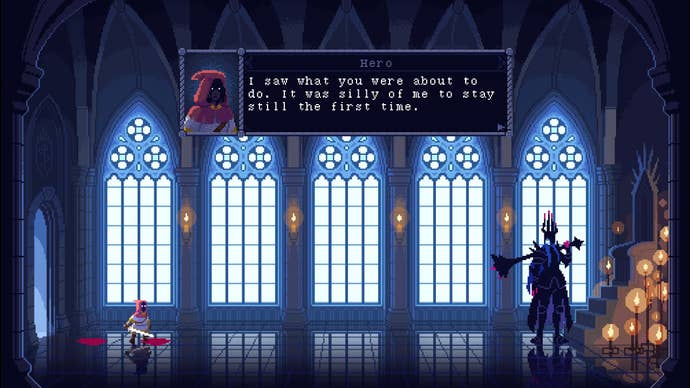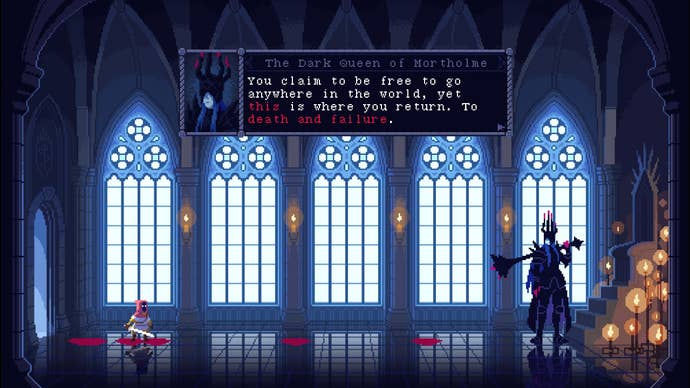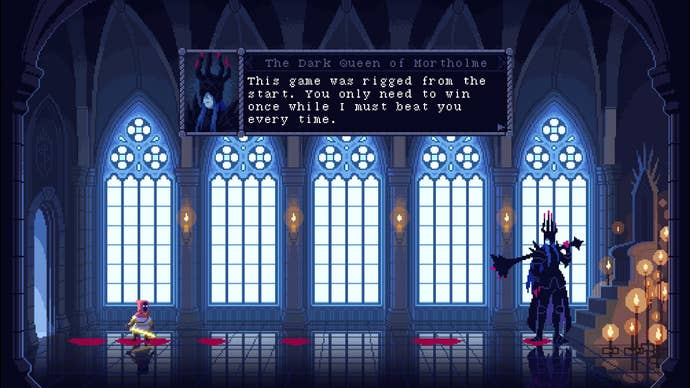There’s a beautiful, wordless moment about ten minutes in to The Dark Queen Of Mortholme. As the titular queen, you’ve just casually mace-flattened the same plucky interloper for the Nth time, then snapped their corpse out of existence in a wreath of electric purple fire with all the ceremony of clearing toast crumbs from a bench.
Watch on YouTube
Each time, just as the queen is about to plonk herself back down on her throne, the hero galumphs trumpetously back through the doorway for another pop. Here’s our premise: both an inversion of Soulsian conventions and a wry tribute, in the way all inversions are. And who hasn’t considered how maddeningly Sisyphean it must feel to be on the receiving end of such smug under-doggedness? “Struggle in the face of overwhelming odds”. “Testament to the persistence of the human spirit”. Mate. You are fucking immortal.
We’ve felt the queen’s frustration grow, forced to consider the toll imposed by folklorish infamy on the actual person behind the myth (every time I try to let my hair down some wanker tries to climb up it, says Rapunzel). But on this occasion, something has changed. The hero is late. And there’s an unmistakable hint of longing as the queen looks toward the door. It’s not completely clear if she’s starting to, y’know, actually enjoy all this. But there is both simple truth and stark tragedy in it: unchallenged dominance must feel unbearably stagnant after the initial high wears off. You eat the same soup daily for decades, you might find yourself oddly fond of the fly that decides to one day show up for swimming lessons.
The hero stands completely still during the first fight, and so falls easily to a lazy, disdainful mace swipe. They soon decide that moving is probably a good idea. So, you get a few new moves: a gap-closing spike, and a devastating magic fire that telegraphs its arrival, sportsmanlike as all supermoves should be.

So, of course, the hero works out how to deal with each move in turn. Later, an achievement pops named “out of tricks?” for using each of the queen’s attacks. A trophy that feels like a admission of defeat – a perfect use of digital paraphernalia as storytelling device I wish was more common. Through these warnings of stagnation, glimpses of potential growth present themselves; dialogue options that offer curiosity or dismissiveness. We soon learn the queen doesn’t even know the layout of her own castle. If she did, she might have done a better job of hiding all those treasure chests.
But no, and so the hero returns with chainmail. Then a shortbow. Then a glowing sword and, for the first time, removes the entirety of one of the queen’s four health bar segments. And I realise, then, that they’re going to win eventually. Bloodstains build up until they coat the floor, but my moves are the same each time. The queen, unchallenged, has been given no reason to stay curious, and so has become stagnant. And now, faced for the first time with something that might inspire her to leave and learn some fancier footwork, she’s probably going to die here. Bloody typical, really: a real reason to change showing up just as it becomes too late to do so.
A boss fight demands a theme, and the music here is all apocalyptic organ pipes, rasping with grandeur and nightmares. Somewhere buried in the mix is a toybox melodica; deeply annoying in the way its plastic honking demands focus as soon as I notice it. That’s the hero, I decide, and I think this is the first time I’ve found myself seriously thinking about boss themes; are they meant to celebrate the grandeur and spectacle of the boss, or the struggle of the hero? The best, I think, do both and neither. Odes not to individuals, but to the moment. The dance.

That bastard melodica aside, I have two large problems with The Dark Queen Of Mortholme, an otherwise thumbs-up worthwhile distraction that wastes not a second of runtime in its crushingly inevitable set-up and and crescendo. The first is a line from the queen about halfway through. Something to the tune of “against the might of the status quo, your actions don’t matter”. Ending Explained, you dumb baby! Less on the nose than “got your nose”, honestly.
And the other is not actually in the game, but on the game’s Steam page. “Experience a (macabre, short-form), second-person indie” – immediately relegating the queen to the status of camera lens, of supporting role. You may notice that these two things share a common thread: they both insist on telling me how I’m supposed to feel about a story short enough to offer ample time for self reflection on the average lunchbreak.
But, hey, I can respect it. It’s not my story, after all. Deeply unpopular take maybe, but an artist’s work belongs to them, I’m just visiting. I can’t begrudge the nudges too hard, bumpy as they are. Still, I’m compelled to offer a read in the form of a deeply self-indulgent anecdote. Although, if you want a quick verdict, only interesting games inspire deeply self-indulgent anecdotes, yes.

A writer and person I have a great deal of respect for on both counts once told me, over a plate of stone-cold fried calamari on a pleasant Los Angeles evening I would soon make less pleasant through a callow and selfish acquiescence to my own need to get embarrassingly obliterated in even the most casual of social situations (thus fulfilling my cliched tourist understanding of the average way an LA evening unfolds), that they had become disillusioned with the power of stories to enact meaningful change in the world. I fell back on a pop-science factoid I’m fond of – that of perceptual filling-in. So much is blur and chaos. Dry and tangled, and we cannot live without the artifice of beginnings, middles, and ends. The motivation and the obstacles. The reasons for going along with this chaotic mess in the first place.
Stories can’t lose their power because they’re the fuel, the driver. I cannot remember what they said next, because I am a ridiculous prick who often forgets to listen to other people when I am too busy waiting for their approval at my having said something I believe to be insightful. I am convinced to this day that if I’d have just listened, I’d have a more more nuanced view on these things that I currently do. Maybe they would have disabused me of this notion completely, but it’s one I still hold: stories are all we’ve got, and good stories from elsewhere are the only thing powerful enough to change how we see the stories that are assigned to us.
At least, that’s the story I tell myself. The story the Dark Queen Of Mortholme tells is one where the hero still gets all the best lines. In this, it’s quite traditional, despite its novel framing. The queen’s real tragedy, as with so many characters that threaten to break convention, is that whatever she does, she’s still trapped in a story. And, either through aims or just convention, it’s someone else’s story at that.
“Perhaps it would be a mercy,” muses the queen on the possibility of the hero’s defeat and surrender. “To be relieved of the burden of trying?”, the hero replies. “No thanks!” (Princess!)
Sounds good, right? And I love it, honestly. It made me feel like fighting. But god, if anything could convince you that, really, there are no new stories, then what better than a game that presents itself as subversion, and ends up in exactly the same place as everything else.







